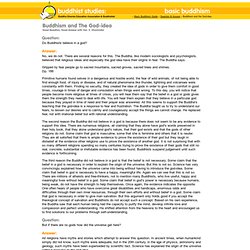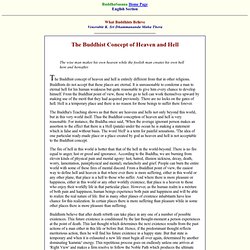

Family tree of the Greek gods. Goddesses. Native american code of ethics. Gandhi autobiography. Buddhism. Do Buddhists believe in a god?

No, we do not. There are several reasons for this. The Buddha, like modern sociologists and psychologists, believed that religious ideas and especially the god idea have their origins in fear. The Buddha says: Gripped by fear people go to sacred mountains, sacred groves, sacred trees and shrines. Primitive humans found selves in a dangerous and hostile world, the fear of wild animals, of not being able to find enough food, of injury or disease, and of natural phenomena like thunder, lightning and volcanoes were constantly with them. The second reason the Buddha did not believe in a god is because there does not seem to be any evidence to support this idea. The third reason the Buddha did not believe in a god is that the belief is not necessary. But if there are no gods how did the universe get here? All religions have myths and stories which attempt to answer this question.
Video: we can be buddhas. Buddhanet. How to mediate. Buddha's lesson on forgiveness. The Buddha was sitting under a tree talking to his disciples when a man came and spit on his face.

He wiped it off, and he asked the man, “What next? What do you want to say next?” The man was a little puzzled because he himself never expected that when you spit on somebody’s face, he will ask, “What next?” He had no such experience in his past. He had insulted people and they had become angry and they had reacted. Buddha’s disciples became angry, they reacted. Buddha said, “You keep silent. “If you think on it deeply,” Buddha said, “he has spit on his own mind. The man was even more puzzled! Puzzled, confused, the man returned home. The next morning he was back there. The man looked at Buddha and said, “Forgive me for what I did yesterday.” Buddha said, “Forgive? Concept of heaven and hell. The wise man makes his own heaven while the foolish man creates his own hell here and hereafter.

The Buddhist concept of heaven and hell is entirely different from that in other religions. Buddhists do not accept that these places are eternal. It is unreasonable to condemn a man to eternal hell for his human weakness but quite reasonable to give him every chance to develop himself. From the Buddhist point of view, those who go to hell can work themselves upward by making use of the merit that they had acquired previously. There are no locks on the gates of hell. The Buddha's Teaching shows us that there are heavens and hells not only beyond this world, but in this very world itself.
The fire of hell in this world is hotter than that of the hell in the world-beyond. Buddhists believe that after death rebirth can take place in any one of a number of possible existences. Heaven is a temporary place where those who have done good deeds experience more sensual pleasures for a longer period. How socialism works. Socialist anarchism. The new movie "V for Vendetta" has provoked public discussion of the meaning of anarchism.

Murray Rothbard was an advocate of the stateless society, but he was never accepted by the anarchist movement and is still considered more a "capitalist lackey" than anarchist thinker. Indeed, anarcho-capitalism has always been considered an oxymoron by the self-proclaimed "true" anarchists. Part of the reason is a general inability to understand different uses and definitions of words in the classical socialist and liberal traditions.
Socialists refer to "capitalism" as the system in which the state hands out and protects capitalists' privileges — and therefore oppression of labor workers. They don't see that capitalism, in the classical liberal tradition, means rather a free market based on free people, i.e., voluntary exchanges of value between free individuals. A deeper and more interesting reason is anarchism's socialist roots. Socialist Time Ignorance Values are Subjective. Why socialism? - einstein. "We shall require a substantially new manner of thinking if mankind is to survive.

" Why Socialism? By Albert Einstein From Monthly Review, New York, May, 1949. [Re-printed in Ideas and Opinions by Albert Einstein] Transcribed by Lenny Gray NOTE: I (Tom Huppi) needed to remove this content due to a DCMA notice. Anarchism. This classic statement of anarchism was written by a diverse group of anarchists in Cardiff around 1980 and it is an interesting historical record of the optimism of mainstream anarchist thought at that time.

There is probably more rubbish talked about anarchism than any other political idea. Actually, it has nothing to do with a belief in chaos, death and destruction. Anarchists do not normally carry bombs, nor do they ascribe any virtue to beating up old ladies. It is no accident that the sinister image of the mad anarchist is so accepted.
The State, the press and all the assorted authoritarian types, use every means at their disposal to present anarchy as an unthinkable state of carnage and chaos. The alleged necessity of authority is so firmly planted in the average mind that anarchy, which means simply 'no government' is almost unthinkable to most people. Yet there are a limitless range of possible societies without the State. Our rulers claim to be protecting us from each other. Video: east vs. west. Video: embrace your inner girl.